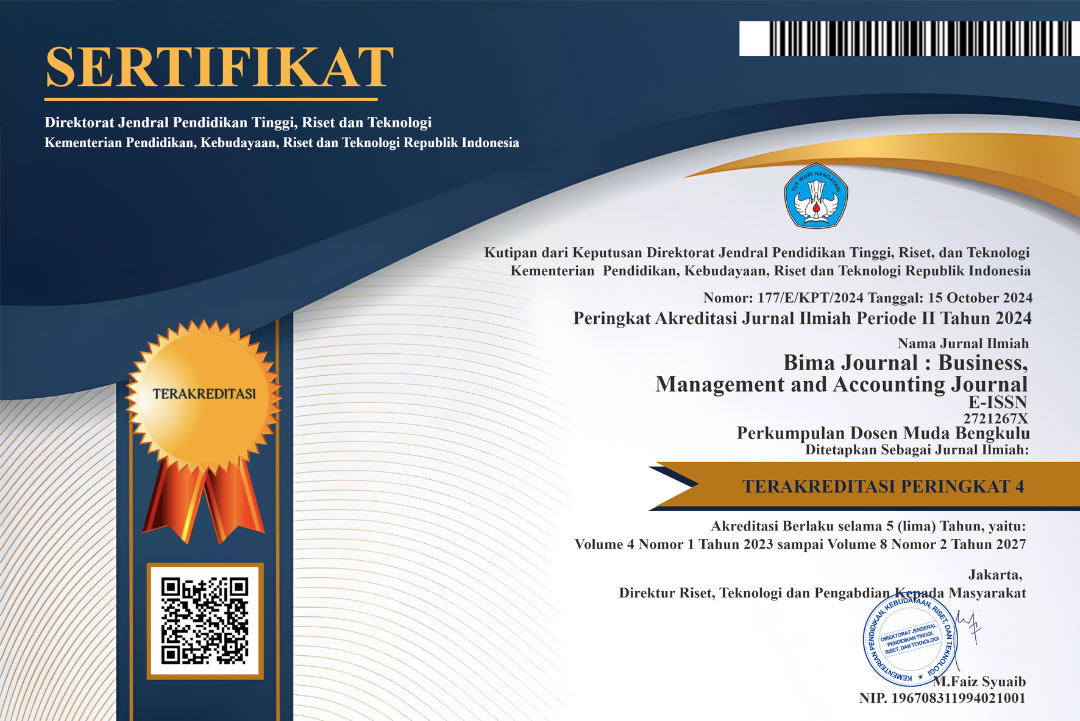The Effect Of Perceived Ease Of Use And Service Quality On Customer Loyalty Through Repurchase Intention As Intervening Variables (Case Study: Gofood Customers In Yogyakarta City)
DOI:
https://doi.org/10.37638/bima.3.1.17-28Abstract
This research examine the effect of perceived ease of use and service quality on customer loyalty and test whether repurchase intention acts as an intervening variable for the effect of perceived ease of use and service quality on Gofood customer loyalty in Yogyakarta City. This research is quantitative by taking 120 samples from Gofood customers in Yogyakarta City. The sampling method is non-probability and the sampling technique uses purposive sampling. Data was collected by sending a questionnaire link that was sent online to respondents. The data were analyzed using the IBM SPSS application. The results of this study indicate that the variable perceived ease of use (X1) has a positive and significant effect on repurchase intention (Z) with a value of 0.000. Then the service quality variable (X2) has a positive and significant effect on repurchase intention (Z) with a value of 0.000. The repurchase intention variable (Z) has a positive and significant effect on customer loyalty (Y) with a value of 0.000. Furthermore, the variable perceived ease of use (X1) has a positive and significant effect on customer loyalty (Y) with a value of 0.008. And the service quality variable (X2) has a positive and significant effect on customer loyalty (Y) with a value of 0.000. In addition, the results of the study also show that repurchase intention is able to act as an intervening variable for the influence of perceived ease of use and service quality on Gofood customer loyalty in the city of Yogyakarta.
References
Bagus Nyoman Udayana, I., & Farida, N. (2019). the Factors Which Influence the Relationship Between a Network’S Synergizing Capability and the Increase in a Salesperson’S Performance. Journal of Indonesian Economy and Business, 34(2), 131. https://doi.org/10.22146/jieb.29221
Davis. (1989). Perceived Usefulness, Perceived Ease of Use, and User Acceptance of Information Technology. MIS Quarterly., 13.
Keni, K., & Sandra, K. K. (2021). Prediksi Customer Experience Dan Service Quality Terhadap Customer Loyalty: Customer Satisfaction Sebagai Variabel Mediasi. Jurnal Muara Ilmu Ekonomi Dan Bisnis, 5(1), 191. https://doi.org/10.24912/jmieb.v5i1.11196
Salsabila, A., & Sampurna, D. S. (2020). ANALYSIS OF THE INFLUENCE OF SOCIAL MEDIA , WORD OF MOUTH , AND INFLUENCER ON PURCHASE DECISIONS ( Case Study On Lovesick Coffee Bekasi ), 1–18.
Sharma, D. P. B. (2020). Interplay Among Customer Satisfaction (Carryover), Repurchase Intention and Customer Loyalty: an Analysis Through Hierarchical Linear Modeling. PalArch’s Journal of Archaeology of Egypt …, 17(6), 5956–5966. Retrieved from https://www.archives.palarch.nl/index.php/jae/article/download/1874/1855
Udayana, I. B. N., Farida, N., Lukitaningsih, A., Tjahjono, H. K., & Nuryakin. (2021). The important role of customer bonding capability to increase marketing performance in small and medium enterprises. Cogent Business and Management, 8(1). https://doi.org/10.1080/23311975.2021.1932239
Downloads
Published
Issue
Section
License
An author who publishes in the BIMA JOURNAL: Business, Management, and Accounting Journal agrees to the following terms:
Author retains the copyright and grants the journal the right of first publication of the work simultaneously licensed under the Creative Commons Attribution-ShareAlike 4.0 License that allows others to share the work with an acknowledgement of the work's authorship and initial publication in this journal
Submission of a manuscript implies that the submitted work has not been published before (except as part of a thesis or report, or abstract); that it is not under consideration for publication elsewhere; that its publication has been approved by all co-authors. If and when the manuscript is accepted for publication, the author(s) still hold the copyright and retain publishing rights without restrictions. For the new invention, authors are suggested to manage its patent before published. The license type is CC-BY-SA 4.0.
BIMA JOURNAL: Business, Management and Accounting is licensed under a Creative Commons Attribution-ShareAlike 4.0 International License.
You are free to:
Share — copy and redistribute the material in any medium or format
Adapt — remix, transform, and build upon the material
for any purpose, even commercially.
The licensor cannot revoke these freedoms as long as you follow the license terms.
Under the following terms:
Attribution — You must give appropriate credit, provide a link to the license, and indicate if changes were made. You may do so in any reasonable manner, but not in any way that suggests the licensor endorses you or your use.
ShareAlike — If you remix, transform, or build upon the material, you must distribute your contributions under the same license as the original.
- No additional restrictions — You may not apply legal terms or technological measures that legally restrict others from doing anything the license permits.
Notices:
- You do not have to comply with the license for elements of the material in the public domain or where your use is permitted by an applicable exception or limitation.
- No warranties are given. The license may not give you all of the permissions necessary for your intended use. For example, other rights such as publicity, privacy, or moral rights may limit how you use the material.





















